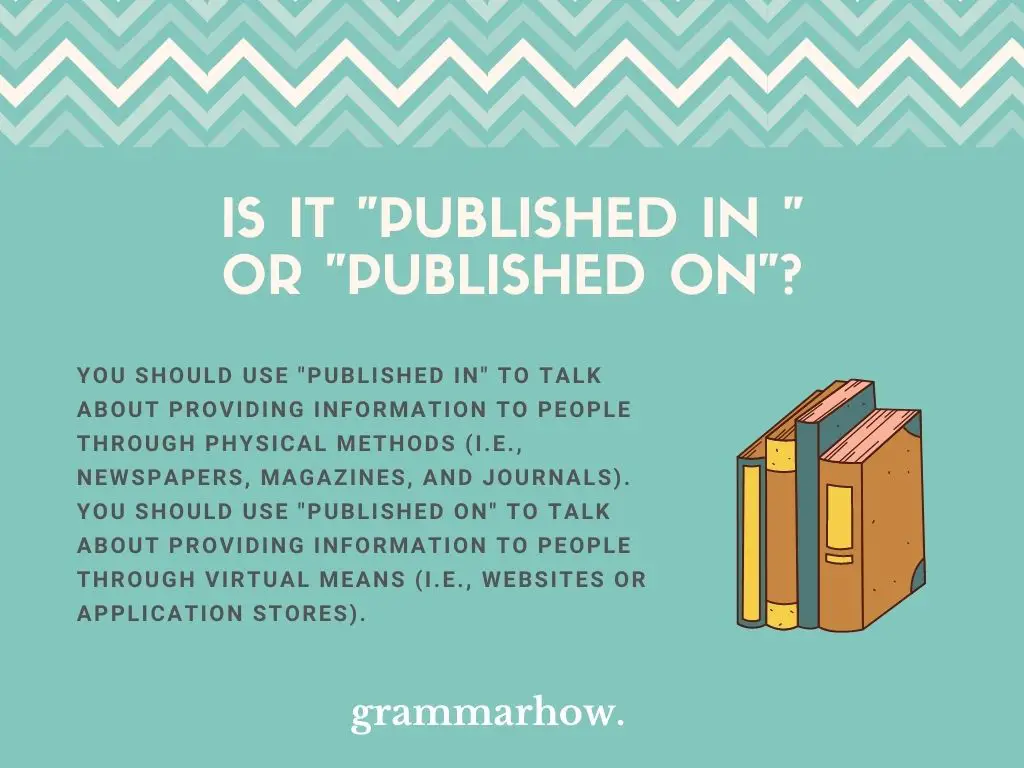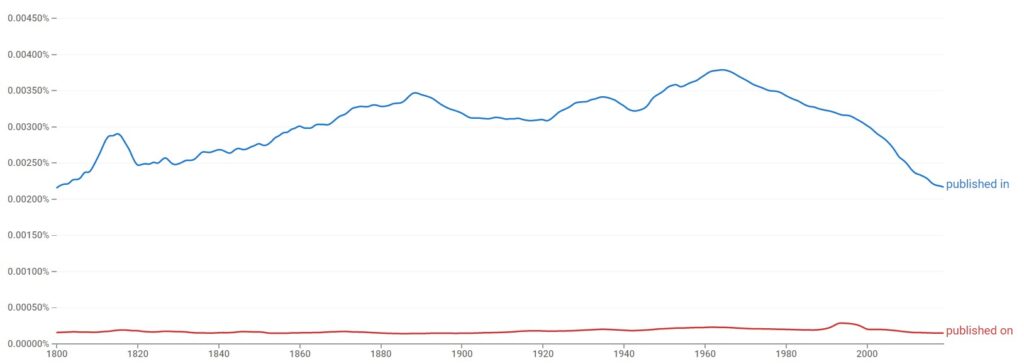Prepositions have a lot of control over the overall meaning of a word. If we look at “published in” and “published on,” while the words are identical, the meanings vary slightly. This article will explain what those differences are and how the prepositions affect them.
Is It “Published In ” Or “Published On”?
You should use “published in” to talk about providing information to people through physical methods (i.e., newspapers, magazines, and journals). You should use “published on” to talk about providing information to people through virtual means (i.e., websites or application stores).

The definition of “publish,” according to The Cambridge Dictionary, is “to make information available to people, especially in a book, magazine, or newspaper, or to produce and sell a book, magazine, or newspaper.”
Of course, this definition is much more old-fashioned than we’re used to today. With the growing prevalence of the worldwide web, we hear the phrase “published on” more often than ever; however, there’s no mention of that in the Cambridge Dictionary definition.
What Does It Mean To Publish Something?
Now that we’ve covered what the prepositions mean in general, it’s time for us to get more specific. We’ll start by talking more about the meaning of the word.
“To publish” is a verb used to provide information for people to read. Usually, that information is printed in a physical format or uploaded in a virtual format. “Publish” makes the information available for the public.
The relationship between “publish” and “public” is what’s most important here. If it’s not provided to the general public, it’s often not “published.” You need to make sure it’s accessible before you’re able to call anything “published.”
What Does It Mean To Be Published In Nature?
There’s a common saying that people use, which is “published in nature.” It’s something anyone can say, and the meaning is almost always recognized by those familiar with the world of publication and journalism.
“Publish in nature” means that you hold your publications to high importance. It can also simply mean that you’ve written a piece that has physically been published in the journal known as “Nature.”
Generally, anyone saying they are “published in nature” is an excellent writer. They often create suitable articles that are available to the world and are riveting reads.
While the original meaning is related to simply getting published in “Nature,” it now more closely means someone values their own writing and believes it to be high quality.
Is “Published In “Or “Published On” Used The Most?
So, which of the two phrases gets used more? If we can figure out which preposition is more popular, we can find out which one most native speakers are happier to use. That helps us to determine which one we should spend more time learning about.
According to Google, “published in” is mentioned 136,000 times on The New York Times website, while “published on” is mentioned 25,000 times.
According to this graph, “published in” is by far the most popular choice. It’s always been much more popular than “published on” (which you’ll notice barely rises above the bottom line on the graph.

These statistics are very interesting. It’s common to publish in newspapers, but it’s also common to publish on websites. You’d think that “published on” would have a little more common usage, especially in the last two decades, but that doesn’t seem to be the case.
It’s mostly because there are more familiar ways to say you’ve published something online rather than using “published on,” which we’ll cover later.
Can “Published In” And “Published On” Ever Be Used Interchangeably?
There are incidences where you might hear the two words used interchangeably. It’s actually more common than you’d think as well.
“Published in” and “published on” are interchangeable when an outlet has both a physical and virtual method of publication. For example, most newspaper outlets (i.e., The New York Times) publish newspapers and upload articles to their websites.
You might see the following:
- This is published in the New York Times.
- This is published on the New York Times.
Both of these mean the same thing. Though it’s much more likely that you’ll see “published in,” you can still write “published on” if you’re referring to reading the articles through the New York Times website rather than the newspaper.
You can think of it as follows:
- This is published on the New York Times (website).
Even though we’re not directly saying “website,” it’s implied by the use of “on,” which only works for virtual methods of publication.
Examples Of How To Use “Published In” In A Sentence
Let’s go over some examples to help you understand the major differences. With these, you can break down when to use each one and make sure you’re getting it right every time.
“Published in” works when we’re talking about a physical publication.
- I am published in thirteen different newspapers.
- This is published in my journal.
- You’re published in the newspaper.
- They’ve created a fantastic article that’ll be published in the magazine tomorrow.
- We’re publishing this in the newspaper as soon as we’re ready.
- I’ve made sure to publish it in a book for the world to see.
- It’ll be published in the Sunday edition if you’re ready for that.
You should use “published in” only when referring to physical copies of things.
Examples Of How To Use “Published On” In A Sentence
Now let’s see how “published on” is different. We can use this more specifically, but that doesn’t mean it’s less common. While the statistics might say it’s unlikely you’ll use it, it’s still best you learn how to work it into a sentence.
“Published on” works when talking about a virtual publication.
- This is published on my personal blog.
- I’ve published it on the website already.
- This is due to be published on Friday.
- We’re publishing the website on Wednesday.
- He’s published many articles on the website.
- You’re published on six different websites.
- I’m published on many online outlets.
A virtual publication is always referred to when using “published on.”
Which Other Prepositions Can Be Used With “Published”?
A few other prepositions you can use after “published” change the meaning even further. It’s good to know what those are before they come up.
Published For
“Published for” is used when you want to talk about the specific company or thing you’ve published your work for.
- I’ve got this published for my boss.
- This is published for the website.
Published Through
“Published through” is used when you want to talk about going through a specific method to get your writing published (usually referring to an agency).
- This is published through my agent.
- I published this through a local company.
Published With
“Published with” is used to talk about a company or someone you worked with to help you publish something. Often, they’ll have written with you or helped you to publish in the end.
- This was published with my boss’ permission.
- I published it with the help of my editor.
Is It Ever Correct To Use “Publish In”?
“Publish in” is correct when you’re using “publish” in the present tense. “Published” is a past tense verb meaning the action has happened already. If you know something will be published in the present, then “publish in” works.
- I’m going to publish this in the newspaper.
Is It Published In Or On A Website?
“Published on a website” is correct. A website is a virtual entity, meaning we use the preposition “on” to refer to it. “Published in a website” is incorrect unless you’re talking about something that has both a physical and virtual presence (most main-line newspaper outlets).
- We published it on a website.
Is It Published In Or On A Magazine?
“Published in a magazine” is correct. A magazine is a physical entity, meaning we use physical methods to publish our piece of writing. “Published on” is never correct here.
- This is published in a magazine.
Is It Published In Or On A Journal?
“Published in a journal” is correct when talking about a physical copy of a journal. “Published on a journal” is correct when talking about a website that is a journal.
- This was published in my journal.
- This was published on an online journal.
Is It Published In Or On A Year?
“Published in a year” is correct when talking about the time frame it took you to complete the publication. “Published on” is incorrect in this case.
- This article was published in a year.
Published – Synonyms
Finally, let’s check out some synonyms and alternatives we can use instead of “published.” If you’re struggling with the prepositions or simply think a better word will suit your writing, take your pick from the following.
- Produced
- Printed
- Issued
- Brought out
- Publicized
- Announced
- Wrote
- Reported
All of these verbs are excellent replacements for “published.” You can take your pick with whichever one you think works best.
Using a synonym mostly relies on the context of your writing. If you don’t think “published” applies to your text, then one of these will always be a better fit.
